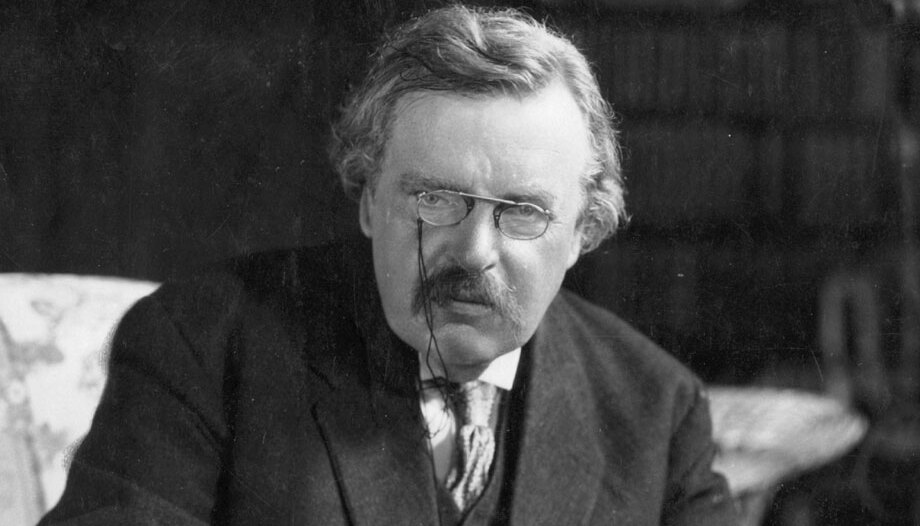The 100th anniversary of the conversion to Catholicism of G. K. Chesterton (1874-1936) is a propitious occasion to approach this brilliant writer, a polemicist of sharp intelligence and a devastating critic of fatuous cultural fashions from the perspective of Christian realism. The prolific English journalist and writer was capable of unveiling human paradoxes and perplexities in the light of the mystery of the living God.
He devoted many pages to the marriage and the family. He frequently highlighted the glaring contradictions of modernity in the understanding of this vital institution for the person and society. Moreover, he incisively recalled the perennial values of conjugal anthropology, in conformity with the Creator's plan, accessible to common sense.
The family, theater of the extraordinary
Chesterton denounces the inanity of the desire for meaningless novelties exhibited by the snob of the moment, by underlining the perennial originality and greatness of the family institution, decisive for human life. "The most extraordinary thing in the world is an ordinary man and an ordinary woman and their ordinary children." says the English thinker with a touch of humor. The family home is the cradle and school of humanity: a place of welcome and protection, of maturation and socialization; it is in the family where one's own identity and value are recognized, where one learns to live and to love. For, in short: "The family is the theater of spiritual drama, the place where things happen, especially things that matter."
The home adventure
The unbridled pursuit of professional success can be a trap - even idolatry - if family values are neglected: "Succeeding at work is not worth it when it means failing at home.". Of course, children can also be the object of disordered love.
"Marriage is an adventure: like going to war." The curiosity of the contemporary tourist, his constant flight to false paradises - often virtual - is vulgar compared to what is really worthwhile: the real adventure consists in staying at home, to respond with courage to the most passionate vocation, and to undertake there the beautiful task of making a home. "When we enter the family, by the act of being born, we enter an incalculable world, a world that has its own strange laws, a world that can exist without us, a world that we did not make. In other words, when we enter the family we enter a fairy tale".
To dedicate one's existence to the enjoyment of unfounded emotions dissolves in an erratic wandering. For the meaning of freedom is commitment: surrendering oneself is to the human being what flying is to the bird. "The love is not blind; that is the last thing it is; love is bondage, and the more bondage the less blind."
The gift of self in favor of others fills life with meaning. The marital and family "we" - born of the conjugal covenant, in conformity with God's plan inscribed in masculinity and femininity, and accessible to formed and mature reason - builds humanity: it is the first challenge we face. "Marriage is a duel to the death that no man of honor should decline."
Divorce superstition
Incompatibility of character is often alleged as a reason for justifying a marital breakdown. Chesterton responds with provocative irony: "I have known many happy marriages, but never a compatible one. The whole purpose of marriage is to struggle and survive from the moment incompatibility becomes unquestionable. For a man and a woman, as such, are incompatible."
Divorce itself qualifies it as superstition, for it is not conceivable to live together without difficulties: "The whole pleasure of marriage consists in the fact that it constitutes a perpetual crisis." he says with unabashed abandon. And yet, living in communion is essential, because loneliness is harmful and sterile. The craftsmanship of family relationships is essential to grow, unfold and give life: we need to help each other, share intimacy, work to make domestic community, overcoming the frictions of the company to get the best out of each other.
Paradox and salvation
In short, only in the presence of the true God - the infinite Being who is in himself interpersonal communion, the source of all family life - can the great contradictions of human life be overcome in the search for the meaning of the mystery that envelops it. For the greatest paradox of human history, and the only one that deciphers its meaning, is the presence of Jesus Christ, the Incarnate Word, the Savior of the world, the Redeemer of mankind and the Bridegroom of the Church. He teaches us that, overcoming human limits to enter into the dimensions of divine life, "To love means to want what is unlovable; to forgive entails forgiving the unforgivable. Faith means believing the unbelievable. To hope means to trust when all seems hopeless".
To learn more
G. K. Chesterton, History of the Family. On the only state that creates and loves its own citizens (edition and introduction by D. Ahlquist). Rialp, Madrid 2023;
Idem, La superstición del divorcio: seguido de divorcio versus democracia. Espuela de Plata, Madrid 2013;
Idem, La mujer y la familia. Styria, Madrid 2006;
Idem, El amor o la fuerza del sino (selection, translation and introduction by Álvaro de Silva). Rialp, Madrid 1993.
J. M. Granados, Transforming love. Marriage and hope in the great stories. Eunsa, Pamplona 2022;
Idem, El evangelio del matrimonio y de la familia. Eunsa, Pamplona 2021.
University of San Dámaso







